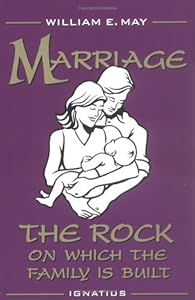SAN FRANCISCO, Dec. 9 /Christian Newswire/ -- In today's society, marriage is under tremendous attack. This raises an important question: is marriage the foundation of family life? Many people today would say, "No!" Others would say, "Yes", but they would define "family" and "marriage" in ways at odds with how the words have been used throughout history. In this revised and expanded edition of "Marriage: The Rock on Which the Family is Built," internationally-renowned theologian William E. May makes the case for marriage's foundational role for family, with marriage defined as the union of one man and one woman. Drawing on Pope John Paul II's "theology of the body," he explains the person-affirming, love-enabling, life-giving, and sanctifying nature of marriage. He shows how marriage is necessarily a complementary union of man and woman and how this rules out the idea of "same-sex" marriage.
May argues, drawing on Popes Paul VI, John Paul II and Benedict XVI, that marriage fully respects the equal dignity of husband and wife as persons, while recognizing their unique, exclusive, enduring, complementary contributions to their union. Likewise, he shows how marriage honors the truth that each new human life brought about by sexual union is a person equal in dignity to his mother and father. Both reason and revelation are used to show that only the family, founded on marriage as an enduring, mutually- exclusive union of one man and one woman, provides the proper context for begetting and raising children.
Reproductive technologies are also critically examined and the author argues that human beings ought to be begotten in an act of spousal love, not made through "in vitro fertilization." Furthermore, the role of the family as the "domestic church," a community of holiness, is explored. This expanded edition includes new chapters: "Pope John Paul II's Catechesis on the Theology of the Body" and "Pope Benedict XVI and Marriage," the latter summarizing Benedict's thought on marriage, particularly as found in his first encyclical "Deus Caritas Est." Also included is Pope John Paul II's "Letter to Families."
William E. May is the Michael J. McGivney Professor of Moral Theology at the John Paul II Institute on Marriage and Family Life in Washington, D.C. He is the author of numerous works in moral theology and ethics.
To interview author William May or request a review copy, please contact Rose Trabbic: rose@ignatius.com or (239)431-5025
Were there to be no support in the whole history of ethical and moral thought, were there no acknowledged confirmation from medical science, were the history of legal opinion to the contrary, we would still have to conclude on the basis of God's Holy Word that the unborn child is a person in the sight of God. He is protected by the sanctity of life graciously given to each individual by the Creator, Who alone places His image upon man and grants them any right to life which they have.
Wednesday, December 9, 2009
Renowned Moral Theologian Offers a Brilliant Defense of Traditional Marriage

